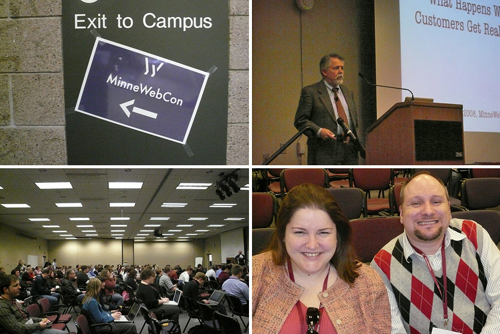
Yesterday’s MinneWebCon was a surprisingly packed event at my rough estimate of 400-450 people. The event was a full-day, three-track, continuing education conference for web professionals with the express intent of providing a venue to deliver “…technical and creative information from industry practitioners and educators directly to University of Minnesota staff, students, and web professionals from ad and design agencies, corporations, non-profit organizations, and other higher education institutions.“
The event was led off with a keynote by a key technology thought leader, Doc Searls, who famously was one of the authors of the seminal work, “The Cluetrain Manifesto“, required reading for anyone interested in the essence of conversational marketing, social media, and the shifts that were just beginning to occur when this thing called the Web was fairly new and the object of unrealistic expectations by too many chasing “eyeballs” instead of people.
At a high level, Doc discussed the progression from Cluetrain to today, telling stories which highlighted what many of us know as obvious truths when it comes to being a web participant. He spent time on a very interesting initiative, Vendor Relationship Management (VRM) as a much needed, power balance between we “customers” (managed within CRM or Customer Relationship Management software) and the vendors who’d like to sell us their stuff.
Sessions on tools, design, technologies, social media and much more were delivered to an audience of people who primarily make their living creating and building Web sites, assets and applications.
The second keynote, Web Culture & Privacy, was by security expert Bruce Schneier. With such quotable gems as, “Security does not equal privacy. Ephemeral is dead” and “Eventually we will have a president who sends LOLcats to other world leaders,” he really brought significantly more awareness to the audience about privacy and was clear that the only way to ensure privacy “…is to legislate it,” making the point that we need to become aware, pressure lawmakers, and drive legislation that makes it possible to retain privacy in an age where digital bits of ourselves are everywhere.
Hats off to Kris Layon and the team at the University of Minnesota for pulling off such a successful event and for opening it up to outside-the-university attendees.